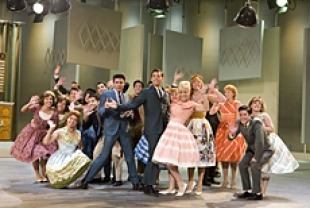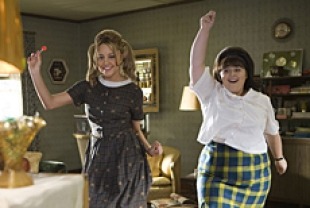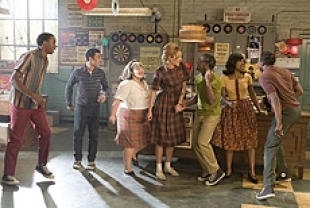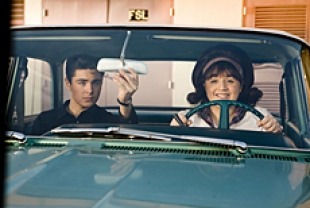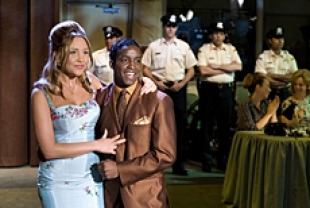Hairspray is based on the 1988 screenplay by John Waters and the 2002 musical stage play. Its choreographer and director, Adam Shankman, has created a jubilant, funny, and phantasmagorical movie about an outsider who finds a way to fulfill her dreams. The opening scene sets the context for all that follows. The energetic and enthusiastic Tracy Turnblad (Nikki Blonsky) jumps out of bed in the morning and on her way to school in 1962 sings "Good Morning Baltimore," a melodic tribute to her working-class neighborhood; she feeds two rats in the street, peeps into her father's magic shop, greets an alcoholic in a bar, and hitches a ride on a garbage truck before reaching her destination. In one fell swoop, we are taken into Tracy's optimistic worldview where everything is shot through with wild possibilities.
Her dream is to appear on "The Corny Collins Show," a local TV dance party whose host (James Marsden) really appreciates the talents of the kids on the show. Tracy is infatuated with Link Larkin (Zac Efron), a cute boy, whose girlfriend Amber (Brittany Snow) is very possessive of him. Amber's domineering mother, Velma (Michelle Pfeiffer), is the TV station manager, and she's doing all she can to help her daughter again win the coveted "Miss Teenage Hairspray" crown. She also wants to see the once-a-month "Negro Day" hosted by record-shop owner Motormouth Maybelle (Queen Latifah) taken off the air.
It is a sheer delight to watch Tracy trying to fulfill her dreams of being a dancer on "The Corny Collins Show." Her father, Wilbur (Christopher Walken), tells her: "Go for it! You've got to think big to be big." Her plus-sized mother, Edna (John Travolta), a stay-at-home laundress, fears that Tracy will be hurt by those who ridicule her big hair and her plus-size figure. But Tracy finds plenty of allies in her best friend Penny (Amanda Bynes), Motormouth's son Seaweed (Elijah Kelley) who teaches her some cool dance moves, and all the kids in Baltimore who share Tracy's outsider status and are tired of seeing "the nicest kids in town" get all the airtime. Tracy's innate hospitality makes her open to the the Negro community, and she's soon marching with them in a stand against racial discrimination. She proves to be a feisty spiritual warrior whose good will toward all models the right stuff.
Some of the comic sequences fall flat but overall, Hairspray is blessed with a vibrant vitality in song and dance that just doesn't stop from the opening to the film's finale "You Can't Stop the Beat." The up-beat music and lyrics of Marc Shaiman and Scott Wittman are catchy and melodic. They have written some new songs for this production, including "Ladies Choice," sung by Elvis-like heartthrob Lin, and "Come So Far (Got So Far to Go)," an inspiring song led by Queen Latifah. Newcomer Blonsky carries the movie on her shoulders and belts out all the power of "I Can Hear the Bells" and her other numbers. Hats off to Shenkman's choreography which is nothing short of sensational.
Special DVD features include: "Sing Along with the Movie Using the Lyric Track"; five deleted scenes including Tracy's never-before-seen musical number, "I Can Wait"; a documentary "You Can't Stop the Beat: The Long Journey of Hairspray"; "Hairspray extensions": Breakin' Down the Dance Scenes; and "The Roots of Hairspray" - from Buddy Deane to Broadway.
